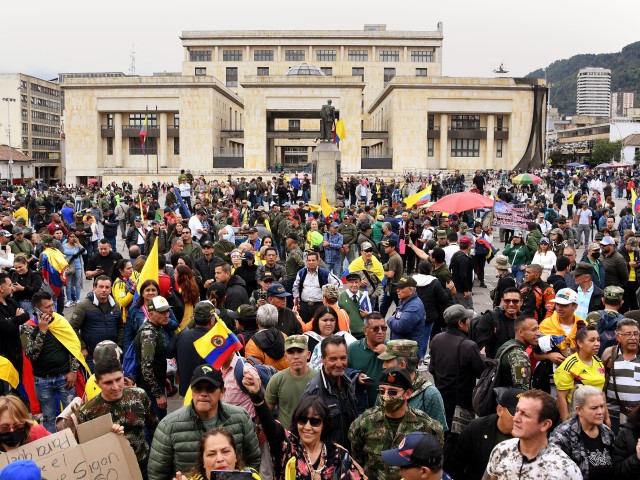Thousands of retired military and police officers in Colombia filled Bolívar Square in the nation’s capital, Bogotá, on Wednesday to peacefully protest the security policies of radical leftist President Gustavo Petro.
The protesters demanded that Petro respect the separation of powers in Colombia in response to controversial statements issued by the far-left president last week in which he claimed that he is “the boss of” the country’s Attorney General Francisco Barbosa, who has been critical of Petro’s policies in the past.
Wednesday’s event is the latest in a series of peaceful protests against the largely unpopular far-left president, who has seen his approval rating plummet dramatically during his first year in office.
Petro, a former member of the Marxist M19 guerilla, became Colombia’s first-ever leftist president in 2022. Since then, he has sought to implement a series of sweeping reforms to the country’s health care, labor, security, energy, and other sectors that have been met with fierce criticism from citizens and politicians alike.
The far-left president, who has not been able to pass his controversial reforms, also broke off his alliance with other Colombian political parties that gave his administration a majority of votes in the Colombian Congress and has reshuffled his cabinet of ministers.
Petro’s disapproval rating reached a new record of 61 percent after he claimed that any attempt to curtail his reforms “could lead to a revolution,” polls released this week revealed.
Many of the participants in Wednesday’s peaceful protest were dressed in their respective military and police uniforms and waved Colombian flags while accompanied by their families, shouting slogans against Petro and his government.
The retired military and police officers criticized the lackluster results of Petro’s security policy and fight against drugs that, according to Petro’s own Defense Ministry, have resulted in a 39-percent reduction in cocaine seizures between January and February 2023 when compared to the same period in 2022, and a reduction in seizures of other types of drugs.
The attendees also observed a minute of silence for their peers who had been killed in action and carried banners with messages such as “Recognition of Our Heroes Despite Progressive Contempt.”
The peaceful protesters took down flags of the Marxist M-19 and the Indigenous Guard guerrillas that socialists had placed on the statue of Venezuelan independence hero Simón Bolívar last week during a pro-Petro rally that took place in the same square. (Bolívar is widely revered throughout South America.)
Retired Colonel Carlos Martínez, one of the event’s organizers, told RCN Radio that the peaceful gathering sought to defend democracy, the Colombian constitution, and the separation of powers.
“The country is going backwards,” Jorge Eliécer Escobar, a member of Colombia’s active military reserve, said. “As reservists feel that we have gone back 25 years.”
“We are with the families of the murdered soldiers, we are doing patriotism and we are doing institutionality,” Juan Carlos Castillo, another Colombian reservist, commented. “We are supporting the institutions and above all we are supporting the Constitution.”
Some of the peaceful protesters also expressed their support for the country’s Attorney General Francisco Barbosa after Petro initiated a feud with him that culminated with Barbosa’s family fleeing from Colombia last week out of fear for their own safety.
On May 3, Petro quoted an article published by Colombian left wing outlet La Nueva Prensa that accused Colombian prosecutor Daniel Hernández of allegedly having covered up a series of murders committed by the Clan del Golfo drug cartel.
One day later, Barbosa denounced that the security of the family of prosecutor Hernandez was put at risk by Petro’s statement. Barbosa also demanded that Petro not interfere in his job.
Petro responded to Barbosa during his official visit to Spain by claiming that as head of state, he was his “boss.”
“The prosecutor forgets one thing that the Constitution orders him: I am the head of State; therefore, I’m his boss,” Petro said in Salamanca, Spain.
The Attorney General responded by reminding Petro that he was appointed by the Colombian Supreme Court and as such, his statements threatened the autonomy and independence of the Prosecutor’s Office while accusing the far-left President of being a dictator. Barbosa then announced to local press that his family would leave Colombia out of fear of being murdered.
“This is not a game, this is not a mechanism that can be taken lightly,” Barbosa said. “Gustavo Petro is not the head of the opposition in a country, he is the head of state.”
